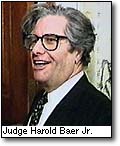NY Judge Baer strikes down bootleg law

A federal grand jury indicted alleged bootlegger Jean Martignon in 2003 for selling "unauthorised recordings of live performances by certain music artists through his business".
Judge Harold Baer Jr, sitting in New York, dismissed charges against a Manhattan-based record dealer which had been brought under the law.In a shocking move:
...
But Judge Baer said US law unfairly granted "seemingly perpetual protection" to the original performances.
US law defines bootlegs as being recordings of the original performances, as opposed to copies of already released music, such as live albums, which are dealt with under piracy legislation.
The Recording Industry Association of America criticised the judge's ruling.
So J. Baer is wondering why there is no time limit on the copyright of material recorded during a live performance. That's a good question. Is it perpetual? Can you sell bootlegged material 70 years after the death of the artists who performed in the recording and be a-ok? I think J. Baer is asking a good question, but he seems to be one of those "liberal activist judges" to me.
BBC Article here.And yes, it's that Judge Baer, the same one that in 1996 ruled that the search of a car was unreasonable because police brutality and corruption are so prevalent in some neighborhoods in New York City that it is natural for people to run away from police. He said that even innocent people flee the police in Washington Heights, a neighborhood where officers were viewed as "corrupt, violent and abusive."
After political pressure came from all directions, including from President Clinton himself (who actually appointed J. Baer), Judge Baer reversed himself and allowed the drug evidence in (80 pounds of cocaine). Judge Baer claimed he reversed himself because of the testimony of a second witness and not because of the political pressure. Although many people considered J. Baer's decision a slap in the face to NYC police officers, the ultimate result of that case made people wonder about true judicial independence.
Here's an article about a more recent J. Baer controversy.





 <
?
law blogs
#
>
<
?
law blogs
#
>

0 Comments:
Post a Comment
<< Home